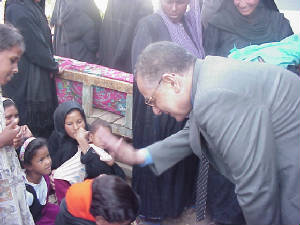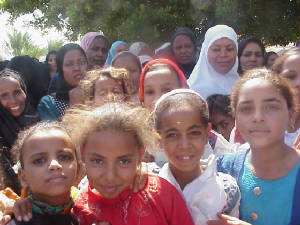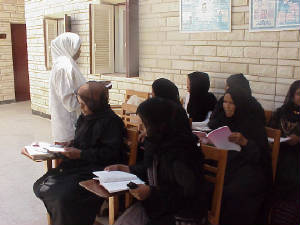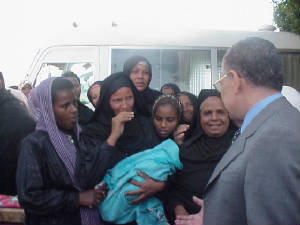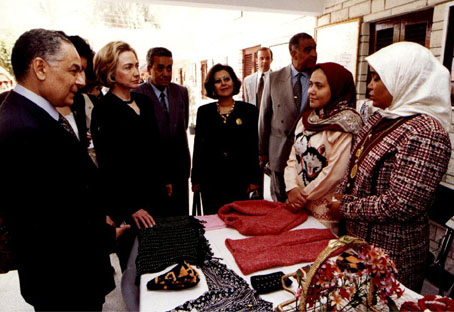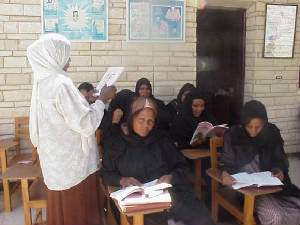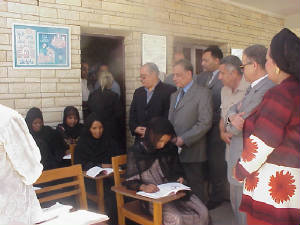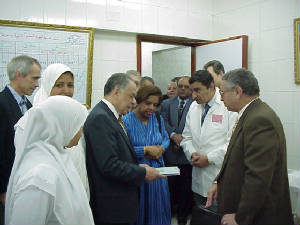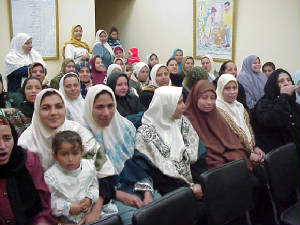|
|
Dr Sallam insured the human right for every woman to have access to a quality reproductive health services. Women HealthProf. Sallam stood firmly to point out that all health problems and population-control issues are related to women’s development (or a lack thereof) hence he transformed Egypt’s health clinics into comprehensive women’s development institutes. He introduced comprehensive healthcare, literacy programs, vocational training and social programs.This resulted in revitalization of the Health Clinics and widely spread Community Moblization.
Women Empowerment Prof. Sallam has devoted a major part of his life to helping Egypt’s unprivileged populations, particularly in the realm of women’s empowerment. His main reform strategies focused on the role of women as agents of social change. His efforts to redefine women’s roles in their families included: advocating an increase in their legal rights; increasing their control over their own fertility; eliminating female illiteracy; and providing formal education, increased participation in the workforce and greater economic self-sufficiency. Prof. Sallam is confident that the progress of any society is closely linked with the progress achieved by its women, maximizing their capacity to participate efficiently and effectively in economic, social, political and cultural development. This is accomplished, he believes, by the emphasis of their vital national role in society and by putting an end to all forms of discrimination against them. His strategies for health development and population control have focused on issues related to gender. Prof. Sallam stood firmly to point out that all health problems and population-control issues are related to women’s development (or a lack thereof) hence he transformed Egypt’s health clinics into comprehensive women’s development institutes. He introduced comprehensive healthcare, health and literacy programs, vocational training and social programs.
Women Clubs He was able to establish over 1000 “women clubs” in the major villages and to develop these villages by responding to the concerns and suggestions coming out from these clubs. These clubs represented an entirely new and vibrant approach to Egyptian health care, had a major impact on health and population control achievements. The clubs embarked on widely diversified programs that included illiteracy programs, vocational training programs, microcredits, health education and close information on different reproductive health issues.
Ministerial Decree Abolishing Female Genital Mutilation After a few months of his appointment as Minister of Health and Population, Prof. Sallam was able to promulgate a ministerial decree abolishing Female Genital Mutilation – a culturally and politically sensitive issue that his predecessors in the Health Ministry had mostly steered clear of. Prof. Sallam successfully addressed this issue, both in public and in the nation’s courts, by presenting it as a response to the demands of every Egyptian woman. Furthermore, this decree preventing female circumcision had a positive impact on the physical and mental health of Egyptian girls and promoted activities that helped form attitudes favorable to the total eradication of that practice.
With the support of international organizations, Dr. Sallam instituted a high committee for mass communication that was able to establish a strategy for utilization of the media to address health and population sensitive issues. These communication skills were valuable in achieving the different goals and in supporting controversial issues such as the FGM ban, and women’s empowerment, where he was able to gain the support of public opinion and religious leaders through open and fruitful dialogue.
A Holistic Approach for Development From the start of his tenure as Minister of Health and Population, Prof. Sallam felt that tackling population or health issues separately only leads to partial solutions and unsustainable development. He therefore adopted a comprehensive and cost effective approach. He introduced the concept of in-field strategic planning where health leaders are invited to brainstorm on ways to tailor specific programs. These custom-designed programs should seek a holistic approach that takes into account all stakeholders in a given area. This tailored approach proved most successful in Egypt’s most underdeveloped and remote areas.
Likewise in his priority campaign on women’s issues, Prof. Sallam favored the holistic approach that is to integrate social, economic, cultural, political and educational aspects to ensure sustainable success. In addressing health and population problems in rural areas, he laid down a basic strategy of mobilization and solidarity of governmental and non-governmental organizations to work together for comprehensive women’s development.
Prof. Sallam has created a healthy environment that encouraged cooperation with the private sector and NGOs as partners for improving population health, and is strongly committed to its promotion and continuation. This principle was successfully applied during the NCPD-1 symposium in Cairo (1996), in which he actively participated with Prof. Nafis Sadek, the Executive Director of the UNFPA.
|
|||||||||||||||||||||
